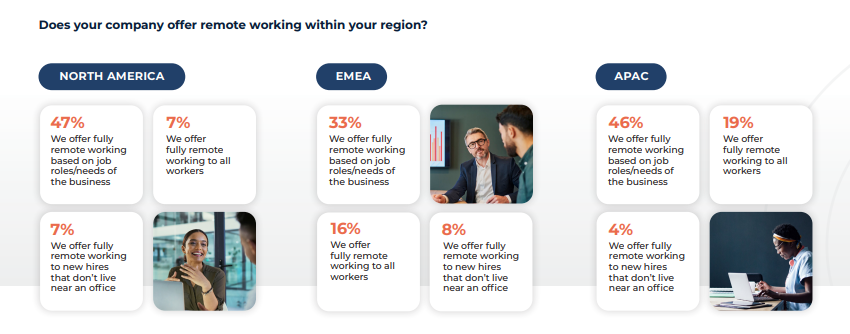HireRight: Twice as many HR leaders expect more remote work, not less, in 2024
UNLEASH delves into the latest HR trends from the workforce management company’s new report with its CHRO Julie Romero.
News In Brief
Hiring remains a challenge for organizations, but they are continuing to recruit at pace.
HireRight's new data shows there are a few things for HR leaders to keep top of mind when hiring, notably continuing to offer remote work.
The workforce management company's CHRO talks UNLEASH through the full report!
Recruitment is still a top challenge for HR leaders across the world – and the leading cause of that is economic uncertainty.
That’s according to new global research from HireRight.
The workforce management tech company surveyed 1,250 HR, risk and talent acquisition leaders globally, and found that around a third of leaders across EMEA, North America and APAC (33%, 38% and 32% respectively) see economic uncertainty as the most significant challenge this year.
Plus, around 38% globally believe the economy will be a long-term acquisition challenge as they look towards 2027 – 39% in North America, 32% in EMEA and 37% in APAC.
Speaking exclusively to UNLEASH, HireRight’s CHRO Julie Romero shares some solutions to the economic uncertainty finding: “To help tackle this, HR leaders should consider and make plans for a wide range of scenarios beyond the control of their company to ensure they are not caught unawares.”
In the HireRight report, Romero calls for HR to prepare for the unexpected, and have to ready to go plans for possible scenarios as they emerge.
Remote work is here to stay
The good news is that the situation isn’t all doom and gloom.
Despite this economic uncertainty, HireRight’s report found that employers are carried on recruiting as normal in 2024.
There was little change on the 2023 figures, and fewer than one in ten HR leaders said they stopped hiring for more than three months.

Credit: HireRight.
But if organizations want to thrive in this challenging hiring market, they need to focus their attention in specific areas.
HireRight’s data shows that the main recruitment challenges leaders are facing are understaffing in the HR team (27% in EMEA and 22% in APAC), having positions that remain unfilled for up to six months (36% in North America and 26% in APAC) and issues with time to hire (27% in EMEA).
This makes sense as leaders are trying to balance hiring speed and quality.
HireRight’s Romero tells UNLEASH: “This year’s data showed a dramatic shift back to accuracy as the top priority for companies choosing a screening provider, with speed, the top response in 2023’s survey, seeing a notable drop.
“While employers still want to get people into their new roles quickly, it’s reassuring to see that accuracy remains a priority.
This is supported by ‘cost of a bad hire’ being among the top answers when respondents were asked about the main risks their company aims to mitigate with employment screening.”
Another interesting recruitment challenge identified in the report is candidates dropping out if remote working isn’t offered (33% in North America and 17% in APAC).
This is particularly noteworthy given that news headlines would suggest that remote work is on its way out.
In reality, HireRight’s data shows that remote hiring is robust – across all three regions, HR leaders hired remote workers, and they offered fully remote working to their employees.
Plus, less than 10% said they were expecting the level of remote working to decline into the future.
HireRight’s report stated: “Almost twice the number of businesses said they were expecting there to be more remote or hybrid working by the end of 2024 than those who expected the practice to reduce.”

Credit: HireRight.
Writing in the report, HireRight’s SVP and Managing Director of EMEA and Latin America Peter Cleverton commented: “While we have seen some of our customers making plans to bring their employees back to the office, or have already done so, employers globally are having to make tough decisions.
“Many must calculate if the benefits of doing so are worth the risk of their employees seeking remote or hybrid employment elsewhere.”
Overall, HireRight found that the benefits outweigh the risks for HR leaders in 2024.
They were particularly interested in the wellbeing and work-life balance benefits (58% in North America, 63% EMEA and 67% in APAC) and having a bigger pool for recruitment (47% for North America, 38% for EMEA, 43% for APAC).
Plus, improved retention (38% in North America, 41% in EMEA, 50% in APAC) was another top benefit – this makes sense as retention challenges are the other side of the HR coin to recruitment.
Sign up to the UNLEASH Newsletter
Get the Editor’s picks of the week delivered straight to your inbox!

Chief Reporter, UNLEASH
Allie is an award-winning business journalist and can be reached at alexandra@unleash.ai.
Contact Us
"*" indicates required fields
Partner with UNLEASH
"*" indicates required fields